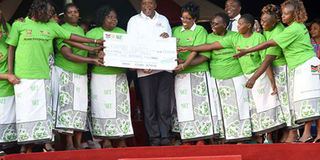Public-private partnership way to go in efforts to uplift women

President Uhuru Kenyatta hands a Sh83.2 million cheque to Kiambu Women Enterprise Fund members at Ndumberi, Kiambu County, on December 5, 2018. Through the fund, women are able to start businesses and become financially independent. PHOTO | FILE | NATION MEDIA GROUP
What you need to know:
- The women have not only achieved great feats in academic and professional qualifications but are also the central cog in the wheel of the small and micro enterprise sector.
- Lenders and angel investors provide capital for youth and women enterprises, corporates have filled the gaps in business skills through mentorship and training programmes.
In the neoliberal market economy regime, corporate-oriented business engagements will continue to dictate the future and speed of economic prosperity and inclusive — rather than exclusivist — economies are what brings progressive and sustainable development.
In the Nordic countries, North America and Western Europe, citizens’ overall trust in systems nourishes individual striving to benefit from and contribute to economic growth.
This should be the case in Kenya, yet the recent “Enterprise Surveys” by the World Bank show a paltry 8.6 per cent of women, despite being half of the population, are majority owners of established registered businesses.
The women have not only achieved great feats in academic and professional qualifications but are also the central cog in the wheel of the small and micro enterprise sector.
Clearly, what is lacking is neither their academic and professional qualifications nor their industry; it is simply systemic gaps that fail to tap into the resource base.
JOINT EFFORTS
And this is a huge setback as women also play a significant role at the family level — that of socialising future generations.
Admittedly, Kenya has several legal and policy frameworks to ensure that women and other marginalised groups meaningfully contribute to economic growth and reduce poverty.
But studies show limited access to capital as the biggest impediment to the modelling and growth of women entrepreneurs, despite scalable ideas, in sub-Saharan Africa.
Aware of this, the government established the Women Enterprise Fund (WEF) and The Youth Fund and set aside 30 per cent of public tenders for youth, women and people with disabilities through Access to Government Procurement Opportunities (AGPO).
These promote start-ups and small businesses. However, their implementation faces challenges — such as inadequate capital outlets, limited credit and lack of essential business skills — which undermine their competitive edge.
But this goes beyond single-handed national and county government solutions. There is, therefore, a need for joint efforts among non-state actors — corporates, NGOs, regulators and financial institutions.
INCLUSIVE APPROACH
And as the government, lenders and angel investors provide capital for youth and women enterprises, corporates have filled the gaps in business skills through mentorship and training programmes.
And this has borne fruit. For instance, since its inception in 2007, the WEF has disbursed over Sh17 billion to 1.6 million women, about Sh150 million to small-scale manufacturing start-ups.
But to have a bigger impact, there is a need for an inclusive approach that involves more economic players — such as capacity enhancement.
Other actors can take a leaf from the Sh12.6 million WEF partnership with Coca-Cola, which has increased access to loans and grants, enabled relevant training of women entrepreneurs in rural and peri-urban areas and provided them with basic business technologies to start and grow their enterprises.
With 557,000 beneficiaries so far, the deal targets a million women.
SUPPORT
In addition, the WEF and the Kenya Bureau of Standards (Kebs) collaboratively offered training on product handling, packaging, processing and preservation to women to help them meet industrial quality requirements and heavily subsidised the rates from Sh35,000 to Sh5,800.
UNDP’s District Business Solutions Centres (DBSC) and Women in Business and Investment Project (WBIP) also promote women, emphasising finance, literacy, marketing, production and managerial training and links start-ups with microfinance and raw material suppliers.
The WBIP aims at upscaling capacity and motivating women to build lasting enterprises with positive impact on society, which aligns with Sustainable Development Goal 3, which is to promote the social and economic empowerment of women.
If Kenya can tap into all these opportunities, the country will be the net beneficiary of women’s stifled potential.
Dr Siundu teaches at the University of Nairobi. Email [email protected]





